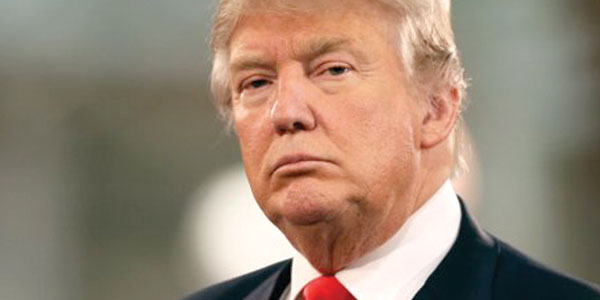
Nadie sabe realmente qué hay dentro de la cabeza de Donald Trump. Pero sí sabemos qué es lo que sale de su boca. Y lo que salió hace poco es “la definición de lo que es un comentario claramente racista”, según dijo el líder del Congreso estadounidense, el Republicano Paul Ryan.
Seamos claros. Es racismo cuando se rechaza, discrimina o descalifica a alguien por el simple hecho de pertenecer a un grupo étnico o racial. Punto. Y eso es exactamente lo que hizo Trump al decir que el juez, Gonzalo Curiel — nacido en Indiana de inmigrantes de México — no podía ser imparcial en un caso judicial — que involucra a la Universidad Trump — por su “herencia mexicana”. Según el torcido y falso argumento del candidato Republicano a la presidencia, el juez Curiel tiene un conflicto de interés. Trump no ve cómo un latino puede ser justo con él después que anunció que quiere construir un muro entre México y Estados Unidos.
Las prejuiciadas declaraciones de Trump me recordaron una entrevista que le hice en el 2013 a la juez de la Corte Suprema de Justicia, Sonia Sotomayor. “Hay mucha gente que cree que el latino no tiene la capacidad de hacer las cosas bien”, me dijo en español. Y luego me dio su fórmula para enfrentar a los racistas: “No me dejé discriminar”.
En política nada es coincidencia. Trump, en unos pocos días, criticó públicamente a cuatro hispanos prominentes: al juez Curiel, a la gobernadora republicana de Nueva México, Susana Martinez, y a los periodistas Tom Llamas de la cadena ABC y Jim Acosta de CNN.
Los ataques de Trump no se han limitado a los hispanos. En una entrevista con la cadena CBS, Trump dijo que “sería posible” que un juez musulmán también estuviera prejuiciado en su contra debido a su propuesta de prohibir la entrada a Estados Unidos a 1.600 millones de musulmanesen el mundo. Trump, aparentemente, no quiere que jueces de origen mexicano o musulmán lo juzguen. Eso se llama discriminación.
Trump se está quedando solo en este asunto. Ryan dijo que sus comentarios eran “absolutamente inaceptables”. Y el líder del Senado, Mitch McConnell, dijo a NBC que “no podía estar más en desacuerdo”, en las palabras de Trump. Sin embargo, la gran contradicción de estos líderes Republicanos es que los dos han dicho que votarán por Trump. No dejan de sorprenderme los políticos que hacen verdaderos malabarismos verbales criticando el racismo de Trump pero manteniéndose fiel a su candidato.
Los comentarios racistas de Trump están creando un verdadero dilema moral entre los Republicanos y los votantes independientes: Si votas o apoyas a un candidato que hace comentarios racistas ¿qué dice eso de ti como persona? Trump, desde luego, se ha metido en serios problemas con sus controversiales declaraciones en el pasado y siempre ha salido adelante. No dudo que este sea también el caso. Dirá, como suele decir, que no dijo lo que dijo o que lo malinterpretaron. Pero todo se lo pudieran cobrar el 8 de noviembre, el día de las elecciones.
“Amo a la gente mexicana”, ha dicho Trump en sus discursos y él cree que le va a ir bien con los hispanos el día de la votación. Pero, muchos latinos no lo quieren. Sólo el 20% de los votantes latinos lo apoyaría, según una encuesta de NBC y el Wall Street Journal. Eso es menos que el 27% que obtuvo Mitt Romney en el 2012 y menos que el 31% de John McCain en el 2008. Y los dos perdieron la presidencia. Los 27 millones de hispanos elegibles para votar son ya el 12% del total de votantes. Nadie puede llegar a la Casa Blanca sin los hispanos. Ni Trump y sus millones.
Trump no entiende que los hispanos no se han tragado su cuento. Cree, ingenuamente, que los hispanos van a votar por él luego de insultarlos — como “criminales” y “violadores” — y de decir que quiere deportar a millones de inmigrantes. Así no funcionan las cosas en nuestras casas. ¿Tú le creerías a alguien que primero te insulta y luego te promete un trabajo?
La gran ironía de esta elección es que los mismos ataques a los hispanos, que tanto impulsaron la candidatura de Trump, serán los que terminarán finalmente con sus aspiraciones presidenciales. Los mexicanos tienen un dicho muy sabio: El que ríe al último, ríe mejor.
(Jorge Ramos, periodista ganador del Emmy, es el principal director de noticias de Univisión Network. Ramos, nacido en México, es autor de nueve libros de grandes ventas, el más reciente de los cuales es “A Country for All: An Immigrant Manifesto”.)
(¿Tiene algún comentario o pregunta para Jorge Ramos? Envié un correo electrónico a Jorge.Ramos@nytimes.com. Por favor incluya su nombre, ciudad y país.)
Can Anyone Judge Trump?
We can’t really know what Donald Trump is thinking, but we do know what he’s saying. And recently he said something that was the “textbook definition of a racist comment,” as Republican House Speaker Paul Ryan put it.
First, let’s be clear about the definition of “racist.” It’s racist to discriminate against or disqualify someone because he belongs to a certain ethnic group. Period. Trump, the presumed Republican presidential nominee, did exactly this recently when he declared that federal Judge Gonzalo Curiel’s “Mexican heritage” would prevent Curiel from being impartial in a case involving Trump University. According to Trump’s rhetoric, Curiel — who was born in Indiana to Mexican immigrant parents — has a conflict of interest due to his heritage. Trump simply can’t understand how a Latino judge, even one with years of experience in the courts, could be fair toward him after his announcement that he wanted to build a wall between Mexico and the United States.
Biased claims like these remind me of an interview I did in 2013 with Supreme Court Justice Sonia Sotomayor. “There are many people who think Latinos don’t have the ability to achieve great things,” she told me in Spanish. And then she shared how she’s dealt with racists in the past: “I didn’t let them discriminate against me.”
In politics, nothing is coincidental. In the course of a few days, Trump publicly criticized four prominent Hispanics: Curiel; Susana Martinez, the Republican governor of New Mexico; and journalists Tom Llamas, from ABC, and Jim Acosta of CNN. But Trump’s attacks have not been limited to Hispanics. In an interview with CBS, he said, “it is possible” that a Muslim judge would be prejudiced against him as well, since he proposed a ban on Muslims entering the United States.
Meanwhile, the more declarations Trump makes about race, the more isolated he becomes on this issue. Ryan said his comments were “absolutely unacceptable,” and Senate Republican leader Mitch McConnell told NBC that he “couldn’t disagree more” with Trump’s words. Nevertheless, McConnell and Ryan still intend to vote for Trump.
I can’t help but be amazed by politicians who condemn Trump’s racism, yet stay committed to him. The truth is that Trump’s racist comments should be creating a real moral dilemma not just among Republicans, but among all voters: If you vote for or support a candidate who often makes racist comments, what does that say about you?
Trump, of course, has gotten himself into trouble in the past for making controversial claims, yet he has always managed to move forward. I don’t doubt that he will move past his remarks about Curiel as well. If things get too heated, Trump will simply say, as he always does, that he didn’t say what he said, or that the media misinterpreted his comments. But eventually, on Nov. 8, Election Day, he will have to pay for everything he has said.
On that day, Trump expects that he’ll do well among Hispanics. “I love Mexican people,” Trump has said in his speeches. However, only 20% of Latino voters would vote for him, according to a recent NBC/Wall Street Journal poll. That’s less than the 27% of Hispanic voters who voted for Mitt Romney in 2012, and the 31% who voted for John McCain in 2008. And both candidates lost their bids for the presidency. The 27 million Hispanics who are eligible to vote are key to this year’s election, and, simply put, nobody can win the White House without the Hispanic vote. Not even Trump.
What Trump fails to understand is that Hispanic voters haven’t bought into his narrative, and will not buy into it. He naively thinks Hispanics will vote for him despite the fact that he wants to deport millions of immigrants. He thinks Hispanics will vote for him after he referred to Mexican immigrants as “criminals” and “rapists.” That’s not how things work in our community. Trump thinks that Hispanics will support him because he says he wants to bring jobs to the U.S. But would you believe someone who insults you first and then promises you a job? In the end, the very same attacks against Hispanics that boosted Trump’s candidacy will put an end to his presidential ambitions.
In times like these, a very wise Mexican proverb often comes to mind: He who laughs last, laughs best.
(Jorge Ramos, an Emmy Award-winning journalist, is a news anchor on Univision and the host of “America With Jorge Ramos” on Fusion. Originally from Mexico and now based in Florida, Ramos is the author of several best-selling books. His latest is “Take a Stand: Lessons From Rebels.” Email him at jorge.ramos@nytimes.com.)










